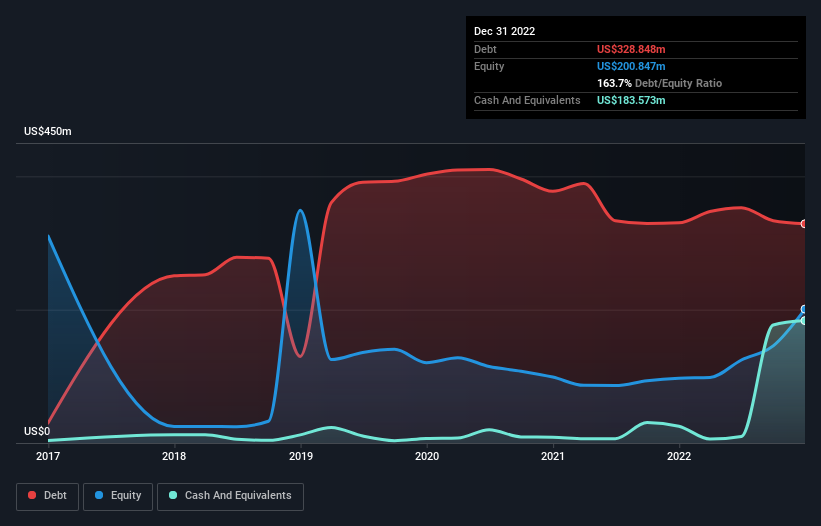- United States
- /
- Hospitality
- /
- NasdaqCM:TH
Does Target Hospitality (NASDAQ:TH) Have A Healthy Balance Sheet?

Some say volatility, rather than debt, is the best way to think about risk as an investor, but Warren Buffett famously said that 'Volatility is far from synonymous with risk.' So it might be obvious that you need to consider debt, when you think about how risky any given stock is, because too much debt can sink a company. As with many other companies Target Hospitality Corp. (NASDAQ:TH) makes use of debt. But should shareholders be worried about its use of debt?
When Is Debt A Problem?
Debt assists a business until the business has trouble paying it off, either with new capital or with free cash flow. Part and parcel of capitalism is the process of 'creative destruction' where failed businesses are mercilessly liquidated by their bankers. However, a more frequent (but still costly) occurrence is where a company must issue shares at bargain-basement prices, permanently diluting shareholders, just to shore up its balance sheet. Of course, debt can be an important tool in businesses, particularly capital heavy businesses. The first thing to do when considering how much debt a business uses is to look at its cash and debt together.
View our latest analysis for Target Hospitality
What Is Target Hospitality's Net Debt?
As you can see below, Target Hospitality had US$328.8m of debt, at December 2022, which is about the same as the year before. You can click the chart for greater detail. However, it also had US$183.6m in cash, and so its net debt is US$145.3m.

How Strong Is Target Hospitality's Balance Sheet?
We can see from the most recent balance sheet that Target Hospitality had liabilities of US$190.9m falling due within a year, and liabilities of US$380.0m due beyond that. Offsetting these obligations, it had cash of US$183.6m as well as receivables valued at US$42.2m due within 12 months. So its liabilities total US$345.2m more than the combination of its cash and short-term receivables.
This deficit isn't so bad because Target Hospitality is worth US$1.24b, and thus could probably raise enough capital to shore up its balance sheet, if the need arose. But we definitely want to keep our eyes open to indications that its debt is bringing too much risk.
We use two main ratios to inform us about debt levels relative to earnings. The first is net debt divided by earnings before interest, tax, depreciation, and amortization (EBITDA), while the second is how many times its earnings before interest and tax (EBIT) covers its interest expense (or its interest cover, for short). Thus we consider debt relative to earnings both with and without depreciation and amortization expenses.
While Target Hospitality's low debt to EBITDA ratio of 0.60 suggests only modest use of debt, the fact that EBIT only covered the interest expense by 4.8 times last year does give us pause. But the interest payments are certainly sufficient to have us thinking about how affordable its debt is. Pleasingly, Target Hospitality is growing its EBIT faster than former Australian PM Bob Hawke downs a yard glass, boasting a 351% gain in the last twelve months. There's no doubt that we learn most about debt from the balance sheet. But ultimately the future profitability of the business will decide if Target Hospitality can strengthen its balance sheet over time. So if you want to see what the professionals think, you might find this free report on analyst profit forecasts to be interesting.
Finally, while the tax-man may adore accounting profits, lenders only accept cold hard cash. So the logical step is to look at the proportion of that EBIT that is matched by actual free cash flow. Over the last three years, Target Hospitality actually produced more free cash flow than EBIT. That sort of strong cash conversion gets us as excited as the crowd when the beat drops at a Daft Punk concert.
Our View
The good news is that Target Hospitality's demonstrated ability to convert EBIT to free cash flow delights us like a fluffy puppy does a toddler. And the good news does not stop there, as its EBIT growth rate also supports that impression! Zooming out, Target Hospitality seems to use debt quite reasonably; and that gets the nod from us. While debt does bring risk, when used wisely it can also bring a higher return on equity. There's no doubt that we learn most about debt from the balance sheet. But ultimately, every company can contain risks that exist outside of the balance sheet. Case in point: We've spotted 3 warning signs for Target Hospitality you should be aware of.
At the end of the day, it's often better to focus on companies that are free from net debt. You can access our special list of such companies (all with a track record of profit growth). It's free.
Valuation is complex, but we're here to simplify it.
Discover if Target Hospitality might be undervalued or overvalued with our detailed analysis, featuring fair value estimates, potential risks, dividends, insider trades, and its financial condition.
Access Free AnalysisHave feedback on this article? Concerned about the content? Get in touch with us directly. Alternatively, email editorial-team (at) simplywallst.com.
This article by Simply Wall St is general in nature. We provide commentary based on historical data and analyst forecasts only using an unbiased methodology and our articles are not intended to be financial advice. It does not constitute a recommendation to buy or sell any stock, and does not take account of your objectives, or your financial situation. We aim to bring you long-term focused analysis driven by fundamental data. Note that our analysis may not factor in the latest price-sensitive company announcements or qualitative material. Simply Wall St has no position in any stocks mentioned.
About NasdaqCM:TH
Target Hospitality
Operates as a specialty rental and hospitality services company in North America.
Flawless balance sheet low.
Similar Companies
Market Insights
Community Narratives


